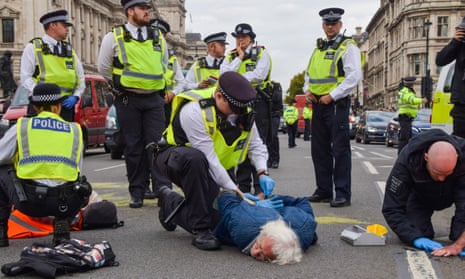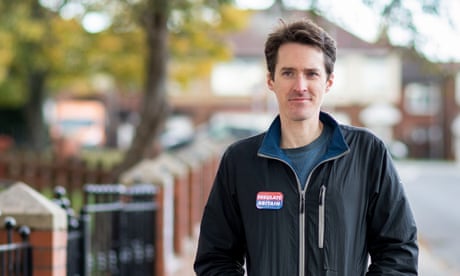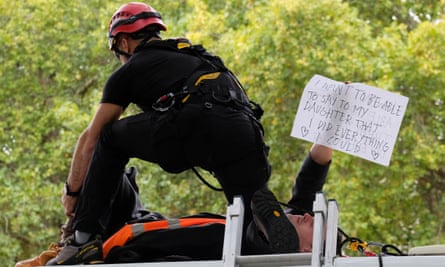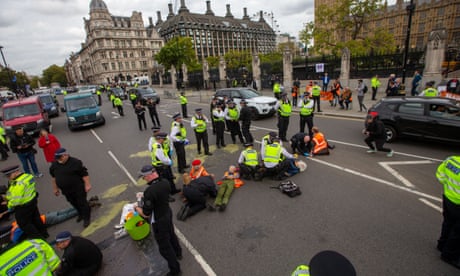
‘Governments are introducing ever more draconian laws against environmental protest.’ Police officers arrest an Insulate Britain activist, Parliament Square, London, October 2022.
Photograph: Vuk Valcic/SOPA Images/REX/Shutterstock
It’s not ‘the whole truth and nothing but the truth’ if campaigners cannot explain their motivations to a jury
It’s not ‘the whole truth and nothing but the truth’ if campaigners cannot explain their motivations to a jury
George Monbiot
Wed 22 Feb 2023
To tell “the truth, the whole truth and nothing but the truth”: this is the oath defendants in an English court must take. But when David Nixon sought to do so, he was sent to jail.
Nixon, who had taken part in an Insulate Britain protest blocking a junction in the City of London, was on trial for causing a public nuisance, a charge that carries a maximum sentence of life imprisonment. He sought to explain his motivation to the jury. But the judge, Silas Reid, had instructed the defendants not to mention their reasons for taking action: namely climate breakdown, fuel poverty and the need for better insulation. When Nixon disregarded this instruction, Reid handed him an eight-week jail sentence for contempt of court.

Insulate Britain activist jailed for eight weeks for contempt of court
Read more
The same instructions were issued by Reid to a defendant in another protest trial, Ruth Cook. She obeyed his directions but, she told me, “It felt really odd. It’s hard to connect to the jury if you can’t explain why you are there.”
He gave the same order to Stephanie Aylett, when she was tried on the charge of public nuisance. She tells me she tried to abide by it. “When I made my closing statement, the judge didn’t interrupt. He let me speak. I was saying things that I thought were just my opinion. Such as that my idea of significant disruption is one-third of Pakistan being under water.” She apologised for “inadvertently causing contempt. I clearly didn’t mean to do it.” The contempt charge was not pursued. The jury found her guilty of the public nuisance charge and she will be sentenced on 24 March.
She told me: “It’s as if you had hit someone in self-defence but were not allowed to say you were being attacked. The judge refused our only two defences: necessity to act and proportionality. How can we talk about this action without saying why we did it?”
The problem is that when people are tried on the ancient charge of public nuisance, motivation and proportionality are not a defence. By choosing this charge, the prosecution service denies defendants the right to explain themselves. It is hard to see how justice is served by ensuring that the whole truth cannot be heard.
As the defendants were unable to speak freely, these cases were assessed as if there were no moral difference between a selfless attempt to prevent the greatest catastrophe humanity has ever faced, and an inebriated ruck after closing time.
 ‘In the UK and other jurisdictions, governments are introducing ever more draconian laws against environmental protest.’ Photograph: Future Publishing/Getty Images
‘In the UK and other jurisdictions, governments are introducing ever more draconian laws against environmental protest.’ Photograph: Future Publishing/Getty Images
Many other environmental protesters have been charged under this stifling law and await trial. It makes you wonder why the government, with such a lethal weapon on the statute book, feels the need to introduce even more oppressive legislation. Police and prosecutors now have so many laws to choose from that they can both prevent any meaningful protest from happening and ensure that protesters’ defences are as weak as possible.
When judges and juries considering other charges are allowed to hear protesters’ motivations, they have in some cases taken a broader view of the law. For example, in 2019 two climate activists were unanimously acquitted by a jury of criminal damage. The defendants admitted spray-chalking a building at King’s College London while seeking to persuade it to divest from fossil fuels, but argued successfully that their action was a proportionate response to the climate crisis.
In 2020, a judge found three Extinction Rebellion protesters guilty of breaching a section 14 public order notice. But he is reported to have told them: “Thank you for your courtesy, thank you for your integrity, thank you for your honesty. You have to succeed.” He is said to have continued: “This is going to be my last Extinction Rebellion trial for a little while. I think they only allow us to do so many of these before our sympathies start to overwhelm us.”
In 2021, the activist Rowan Tilly was convicted for obstruction of the highway during an Extinction Rebellion protest. But the judge, citing the civil rights, anti-apartheid and suffragette movements, praised her as “honest” and “sincere” and gave her an absolute discharge. In the same year, a jury acquitted six Extinction Rebellion protesters of criminal damage to Shell’s London headquarters, after they were able to explain their reasons.

Insulate Britain and Just Stop Oil vow to continue disruptive action
Read more
Last year, seven Doctors for Extinction Rebellion were acquitted of breaching section 14 charges. The judge said: “I was impressed by the integrity and rationality of their beliefs … their evidence was highly moving.” This month, four Scientists for Extinction Rebellion won their appeal against criminal damage convictions in Southwark crown court. The judge said:“The protesters held heartfelt and real concerns about climate change and these are very important issues.”
As our environmental emergencies intensify, so do the costs of seeking to defend our life support systems. In the UK and other jurisdictions, governments are introducing ever more draconian laws against environmental protest, protecting the profits of destructive industries against their challengers. They seek, by various means, to silence us: extreme and tyrannical laws against dissent, surveillance and espionage, attempts in some cases to treat us as terrorists.
These efforts to stifle protest make it even more important that, when cases come to court, the whole truth is told. No decision is improved by knowing less. But knowledge is inimical to power. As the former prime minister John Major remarked, during another of the Tories’ periodic assaults on justice: “Society needs to condemn a little more and understand a little less.”
The protesters condemned as criminals today will be the heroes of tomorrow. One of the greatest fears of those who wield power is that judges and juries will come to see them this way.
This article was amended on 22 February 2023 to accurately set out the details of the charge of which Stephanie Aylett was convicted.
Wed 22 Feb 2023
To tell “the truth, the whole truth and nothing but the truth”: this is the oath defendants in an English court must take. But when David Nixon sought to do so, he was sent to jail.
Nixon, who had taken part in an Insulate Britain protest blocking a junction in the City of London, was on trial for causing a public nuisance, a charge that carries a maximum sentence of life imprisonment. He sought to explain his motivation to the jury. But the judge, Silas Reid, had instructed the defendants not to mention their reasons for taking action: namely climate breakdown, fuel poverty and the need for better insulation. When Nixon disregarded this instruction, Reid handed him an eight-week jail sentence for contempt of court.

Insulate Britain activist jailed for eight weeks for contempt of court
Read more
The same instructions were issued by Reid to a defendant in another protest trial, Ruth Cook. She obeyed his directions but, she told me, “It felt really odd. It’s hard to connect to the jury if you can’t explain why you are there.”
He gave the same order to Stephanie Aylett, when she was tried on the charge of public nuisance. She tells me she tried to abide by it. “When I made my closing statement, the judge didn’t interrupt. He let me speak. I was saying things that I thought were just my opinion. Such as that my idea of significant disruption is one-third of Pakistan being under water.” She apologised for “inadvertently causing contempt. I clearly didn’t mean to do it.” The contempt charge was not pursued. The jury found her guilty of the public nuisance charge and she will be sentenced on 24 March.
She told me: “It’s as if you had hit someone in self-defence but were not allowed to say you were being attacked. The judge refused our only two defences: necessity to act and proportionality. How can we talk about this action without saying why we did it?”
The problem is that when people are tried on the ancient charge of public nuisance, motivation and proportionality are not a defence. By choosing this charge, the prosecution service denies defendants the right to explain themselves. It is hard to see how justice is served by ensuring that the whole truth cannot be heard.
As the defendants were unable to speak freely, these cases were assessed as if there were no moral difference between a selfless attempt to prevent the greatest catastrophe humanity has ever faced, and an inebriated ruck after closing time.
 ‘In the UK and other jurisdictions, governments are introducing ever more draconian laws against environmental protest.’ Photograph: Future Publishing/Getty Images
‘In the UK and other jurisdictions, governments are introducing ever more draconian laws against environmental protest.’ Photograph: Future Publishing/Getty ImagesMany other environmental protesters have been charged under this stifling law and await trial. It makes you wonder why the government, with such a lethal weapon on the statute book, feels the need to introduce even more oppressive legislation. Police and prosecutors now have so many laws to choose from that they can both prevent any meaningful protest from happening and ensure that protesters’ defences are as weak as possible.
When judges and juries considering other charges are allowed to hear protesters’ motivations, they have in some cases taken a broader view of the law. For example, in 2019 two climate activists were unanimously acquitted by a jury of criminal damage. The defendants admitted spray-chalking a building at King’s College London while seeking to persuade it to divest from fossil fuels, but argued successfully that their action was a proportionate response to the climate crisis.
In 2020, a judge found three Extinction Rebellion protesters guilty of breaching a section 14 public order notice. But he is reported to have told them: “Thank you for your courtesy, thank you for your integrity, thank you for your honesty. You have to succeed.” He is said to have continued: “This is going to be my last Extinction Rebellion trial for a little while. I think they only allow us to do so many of these before our sympathies start to overwhelm us.”
In 2021, the activist Rowan Tilly was convicted for obstruction of the highway during an Extinction Rebellion protest. But the judge, citing the civil rights, anti-apartheid and suffragette movements, praised her as “honest” and “sincere” and gave her an absolute discharge. In the same year, a jury acquitted six Extinction Rebellion protesters of criminal damage to Shell’s London headquarters, after they were able to explain their reasons.

Insulate Britain and Just Stop Oil vow to continue disruptive action
Read more
Last year, seven Doctors for Extinction Rebellion were acquitted of breaching section 14 charges. The judge said: “I was impressed by the integrity and rationality of their beliefs … their evidence was highly moving.” This month, four Scientists for Extinction Rebellion won their appeal against criminal damage convictions in Southwark crown court. The judge said:“The protesters held heartfelt and real concerns about climate change and these are very important issues.”
As our environmental emergencies intensify, so do the costs of seeking to defend our life support systems. In the UK and other jurisdictions, governments are introducing ever more draconian laws against environmental protest, protecting the profits of destructive industries against their challengers. They seek, by various means, to silence us: extreme and tyrannical laws against dissent, surveillance and espionage, attempts in some cases to treat us as terrorists.
These efforts to stifle protest make it even more important that, when cases come to court, the whole truth is told. No decision is improved by knowing less. But knowledge is inimical to power. As the former prime minister John Major remarked, during another of the Tories’ periodic assaults on justice: “Society needs to condemn a little more and understand a little less.”
The protesters condemned as criminals today will be the heroes of tomorrow. One of the greatest fears of those who wield power is that judges and juries will come to see them this way.
This article was amended on 22 February 2023 to accurately set out the details of the charge of which Stephanie Aylett was convicted.

George Monbiot is a Guardian columnist
‘An absolute trauma’: Insulate Britain activists on anguish of court trials
Damien Gayle and Sandra Laville

Activists blocking the M25 in September 2021.
Damien Gayle and Sandra Laville
The Guardian
Fri, 24 February 2023
The hi-vis jackets, banners and pumping adrenaline that fuelled their attention-grabbing actions have gone. Instead the climate activists of Insulate Britain are filing into English courtrooms day after day, taking part in what some have likened to a cat and mouse game in which the stakes – personal, financial and emotional – are high.
Their mass-arrest actions, which brought serious disruption to rush hour traffic on the M25 and around the south-east, are playing out their end stages in a criminal justice system beset by delays for most cases, but surprisingly efficient at putting non-violent demonstrators in front of magistrates and judges.
Alongside a slew of magistrates court trials – at least 30 activists are due in court in Chelmsford this year alone – the Crown Prosecution Service has charged 56 supporters of Insulate Britain to answer at least 201 counts of causing a public nuisance. All have pleaded not guilty and since November one London court has held a trial each week of the group’s supporters. The trials stretch out on the court lists there, and in cameos at several other courts, until at least December this year.
In the scruffy yet imposing and implacable wood-panelled surroundings of Inner London crown court, where most will take place, the strain on activists was this week beginning to show.
“The whole system seems so unfair,” said Helen Redfern, 58, who had come to watch from the public gallery as four more stood trial. She faces a potential jail sentence herself after she was convicted at the same court in February.
“It has been an absolute trauma,” she said. “Firstly deciding to do the action then taking part was the most mentally and physically exhausting, then going though the trial was so stressful and exhausting.
“The one thing I find the hardest to take is when people say: you are right. Caitlin Moran in the Times said we are right. And we are right. We are on the right side of history. But while people say we are right we are facing jail for doing what is right.”
Fri, 24 February 2023
The hi-vis jackets, banners and pumping adrenaline that fuelled their attention-grabbing actions have gone. Instead the climate activists of Insulate Britain are filing into English courtrooms day after day, taking part in what some have likened to a cat and mouse game in which the stakes – personal, financial and emotional – are high.
Their mass-arrest actions, which brought serious disruption to rush hour traffic on the M25 and around the south-east, are playing out their end stages in a criminal justice system beset by delays for most cases, but surprisingly efficient at putting non-violent demonstrators in front of magistrates and judges.
Alongside a slew of magistrates court trials – at least 30 activists are due in court in Chelmsford this year alone – the Crown Prosecution Service has charged 56 supporters of Insulate Britain to answer at least 201 counts of causing a public nuisance. All have pleaded not guilty and since November one London court has held a trial each week of the group’s supporters. The trials stretch out on the court lists there, and in cameos at several other courts, until at least December this year.
In the scruffy yet imposing and implacable wood-panelled surroundings of Inner London crown court, where most will take place, the strain on activists was this week beginning to show.
“The whole system seems so unfair,” said Helen Redfern, 58, who had come to watch from the public gallery as four more stood trial. She faces a potential jail sentence herself after she was convicted at the same court in February.
“It has been an absolute trauma,” she said. “Firstly deciding to do the action then taking part was the most mentally and physically exhausting, then going though the trial was so stressful and exhausting.
“The one thing I find the hardest to take is when people say: you are right. Caitlin Moran in the Times said we are right. And we are right. We are on the right side of history. But while people say we are right we are facing jail for doing what is right.”

Activists blocking the M25 in September 2021.
Photograph: Mark Kerrison/Alamy
There is also a heavy financial burden. Emma Smart was convicted of causing a public nuisance in February. She and her co-defendants had been ordered to pay £90,000 costs. A judge had halved that, leaving each with a £5,000 bill, which they had agreed to pay off at a rate of about £5 a month. Now they have been ordered to pay a further £3,000 after the government made a renewed application.
“They’ve sent me through forms, I was supposed to do them yesterday, I just haven’t,” Smart said. “I’m just so upset that I’m just like: Fuck you. I’m just going to fill out the form with ‘fuck you’ in every box. And that’s not good.”
As well as the heavy fines, Smart is waiting for another trial later this year and also waiting to see if she will face further charges, including a possible charge of conspiracy, after the house she was staying in was raided by police last August.
Among the activist community there was a strong support network, Smart said. But they are trying to hold each other together in the face of what many perceived as a crackdown by the government – and for some, wellbeing is beginning to fray.
“The kind of individual who’s willing to sit on a motorway is the kind of person who’s very emotionally charged and also potentially more vulnerable, as well,” Smart said. “So there are a lot of vulnerable people in our community, you know? People who are suffering with depression or anxiety. We’ve got a disproportionate amount of people amongst activists who do already suffer with that.”
“Also we haven’t had a win,” Smart said. “I think that that’s a big thing. There’s nothing that we can go: yes, we’ve achieved this. There’s no sense of everything we’ve done has been worth it because the government have insulated homes: there’s none of that. So everything we’re doing, going through feels [like] that sort of sense of we’re losing, they’re winning. That’s really strong.
“That’s certainly how I feel. I feel like we’re fighting a huge monster and the monster is winning. And what do you do? We’re not seeing more numbers of people coming. It’s the same small group of exhausted burnt-out people.”
A feature of the legal process that weighs heavy on the Insulate Britain defendants is the strict legal restrictions on what they can say to jurors. In a number of the cases held already, where the charge is public nuisance, the defendants have been instructed not to mention the climate crisis or any other motivation. One of their number has already been jailed for eight weeks for contempt after he gave a speech to jurors explaining how he was driven by the pace of climate change to take the action.
Oliver Rock, 42, from south London, was convicted of causing a public nuisance in February. He said he pleaded not guilty to the latest charge, expecting he would be able to use his day in court to mention climate breakdown, even if the judge told jurors to disregard his remarks.
“If you take climate change out of the picture, then yeah, we’re guilty,” Rock said. “Yeah, I obviously intentionally caused a traffic jam. Like, this is just absurd, to completely remove that [defence].”
Rock, who was jailed in 2021 for breaking an injunction banning protests on the M25, and also has been ordered to pay thousands of pounds in costs, faces three more public nuisance trials this year, for various actions. He, like most of the defendants, is representing himself in court, adding to the burden of dealing with the legal process.
“You have that time in court, plus a plea hearing for each one, which you have to go to court for,” he said. “Plus admin, and trial preparation days and stuff, is an enormous amount of time and energy, which goes into this bureaucracy.
“I’m really bad at admin. But you kind of have to keep on top of it, because you could potentially go to prison again if you don’t keep on top of it – accidentally.”
Insulate Britain’s members are not the only ones facing trials. Hundreds of charges have been laid against the activists of Just Stop Oil, too. Unlike Insulate Britain, that campaign also includes a large contingent of young people. “The pressure is huge, especially on young people; the criminal record is obviously something that’s really damaging to career prospects,” Smart said. Nonetheless, many were becoming involved, some choosing to quit university.
Rock said criticisms of Just Stop Oil for tempting young people into direct actions with potentially severe legal consequences had weight, but equally were unhelpful. “I’ve spent time around these young people and I think that they are so amazing: their care for other people, and their dedication and their understanding of what the near future means – they have such a strong sense of it. And it is heartbreaking to see what they’re up against. And they’re really committed to the struggle.
“What my suggestion for other people would be [is], instead of criticising Just Stop Oil, you should raise up your level of what you’re doing in this struggle. Because just criticising Just Stop Oil, and then not really doing anything effective, is also or just as much betrayal of young people.”
There is also a heavy financial burden. Emma Smart was convicted of causing a public nuisance in February. She and her co-defendants had been ordered to pay £90,000 costs. A judge had halved that, leaving each with a £5,000 bill, which they had agreed to pay off at a rate of about £5 a month. Now they have been ordered to pay a further £3,000 after the government made a renewed application.
“They’ve sent me through forms, I was supposed to do them yesterday, I just haven’t,” Smart said. “I’m just so upset that I’m just like: Fuck you. I’m just going to fill out the form with ‘fuck you’ in every box. And that’s not good.”
As well as the heavy fines, Smart is waiting for another trial later this year and also waiting to see if she will face further charges, including a possible charge of conspiracy, after the house she was staying in was raided by police last August.
Among the activist community there was a strong support network, Smart said. But they are trying to hold each other together in the face of what many perceived as a crackdown by the government – and for some, wellbeing is beginning to fray.
“The kind of individual who’s willing to sit on a motorway is the kind of person who’s very emotionally charged and also potentially more vulnerable, as well,” Smart said. “So there are a lot of vulnerable people in our community, you know? People who are suffering with depression or anxiety. We’ve got a disproportionate amount of people amongst activists who do already suffer with that.”
“Also we haven’t had a win,” Smart said. “I think that that’s a big thing. There’s nothing that we can go: yes, we’ve achieved this. There’s no sense of everything we’ve done has been worth it because the government have insulated homes: there’s none of that. So everything we’re doing, going through feels [like] that sort of sense of we’re losing, they’re winning. That’s really strong.
“That’s certainly how I feel. I feel like we’re fighting a huge monster and the monster is winning. And what do you do? We’re not seeing more numbers of people coming. It’s the same small group of exhausted burnt-out people.”
A feature of the legal process that weighs heavy on the Insulate Britain defendants is the strict legal restrictions on what they can say to jurors. In a number of the cases held already, where the charge is public nuisance, the defendants have been instructed not to mention the climate crisis or any other motivation. One of their number has already been jailed for eight weeks for contempt after he gave a speech to jurors explaining how he was driven by the pace of climate change to take the action.
Oliver Rock, 42, from south London, was convicted of causing a public nuisance in February. He said he pleaded not guilty to the latest charge, expecting he would be able to use his day in court to mention climate breakdown, even if the judge told jurors to disregard his remarks.
“If you take climate change out of the picture, then yeah, we’re guilty,” Rock said. “Yeah, I obviously intentionally caused a traffic jam. Like, this is just absurd, to completely remove that [defence].”
Rock, who was jailed in 2021 for breaking an injunction banning protests on the M25, and also has been ordered to pay thousands of pounds in costs, faces three more public nuisance trials this year, for various actions. He, like most of the defendants, is representing himself in court, adding to the burden of dealing with the legal process.
“You have that time in court, plus a plea hearing for each one, which you have to go to court for,” he said. “Plus admin, and trial preparation days and stuff, is an enormous amount of time and energy, which goes into this bureaucracy.
“I’m really bad at admin. But you kind of have to keep on top of it, because you could potentially go to prison again if you don’t keep on top of it – accidentally.”
Insulate Britain’s members are not the only ones facing trials. Hundreds of charges have been laid against the activists of Just Stop Oil, too. Unlike Insulate Britain, that campaign also includes a large contingent of young people. “The pressure is huge, especially on young people; the criminal record is obviously something that’s really damaging to career prospects,” Smart said. Nonetheless, many were becoming involved, some choosing to quit university.
Rock said criticisms of Just Stop Oil for tempting young people into direct actions with potentially severe legal consequences had weight, but equally were unhelpful. “I’ve spent time around these young people and I think that they are so amazing: their care for other people, and their dedication and their understanding of what the near future means – they have such a strong sense of it. And it is heartbreaking to see what they’re up against. And they’re really committed to the struggle.
“What my suggestion for other people would be [is], instead of criticising Just Stop Oil, you should raise up your level of what you’re doing in this struggle. Because just criticising Just Stop Oil, and then not really doing anything effective, is also or just as much betrayal of young people.”
No comments:
Post a Comment